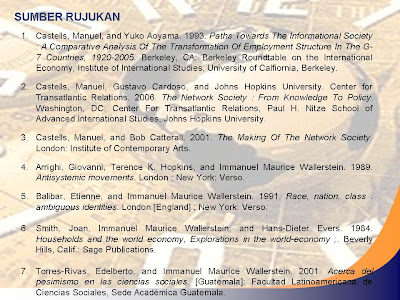 The world bank estimated that there were 45 serious financial crises that erupted throughout the world in the 1980's, but this had increased by almost one and a half times to 65 crises recorded in the 1990's. Furthermore, due to the effects of contagion, a financial crisis in one remote part of the world will probably affect our nation more than it did before. As such, besides taking action on the domestic front, we must continue to press for reforms of the international financial architecture, even though it may no longer be fashionable to do so.
The world bank estimated that there were 45 serious financial crises that erupted throughout the world in the 1980's, but this had increased by almost one and a half times to 65 crises recorded in the 1990's. Furthermore, due to the effects of contagion, a financial crisis in one remote part of the world will probably affect our nation more than it did before. As such, besides taking action on the domestic front, we must continue to press for reforms of the international financial architecture, even though it may no longer be fashionable to do so.Geo-political developments will also affect the global economy in a more pronounced fashion in the future. Since the end of the cold war, and now with the impetus of the new war on terror, we have begun to witness the unilateral designs of one superpower to dominate the world. The war in Iraq and the harsh polemic directed towards Syria and Iran are instances of this. When you add the other skirmishes taking place in the world - such as the flare up in Aceh and the Palestinian-Israeli conflict - then you have a world full of potential flashpoints that could cause much uncertainty and disruption to the global economy. Natural disasters and other unexpected shocks can also wreak havoc on the economy. The recent phenomenon of Severe Acute Respiratory Syndrome (S.A.R.S.) Affected Asian economies more starkly than the war in Iraq. Planes were grounded and hotel bookings were cancelled, as the fear of S.A.R.S. brought travel and tourism almost to a halt. Thankfully, this virus seems to have been brought under control, but we must be alert to any possible relapse and be ready to deal with any eventuality.
A key aspect of competitiveness relates to the efficiency and effectiveness of the public service delivery system and urban governance. In fact, in the first meeting of the cabinet committee on national competitiveness (of which I am the chairman), this delivery system was identified for further enhancement in our quest to improve national competitiveness. True, the private sector acts as the engine of growth, but this engine cannot run in a vacuum. The speed, efficiency and effectiveness with which the public sector serves the private sector determines the speed, efficiency and effectiveness of our corporations. Besides enhancing our competitiveness, we must improve our urban governance and public service delivery system simply because our citizens demand it. As the nation develops, and as our citizens become more affluent and sophisticated, more and more will be required of the government and civil service. I remember when we had to be absent from the office a good part of a day just to get our driver's license renewed. Now, not only does it take a mere five minutes, we need not go to the road transport department anymore; we can renew it even at the post office.
Furthermore, a conducive business environment is dependent not only on the relevant rules and regulations, but also on the services provided by the public sector. As taxpayers, individual citizens are also constantly looking for high quality services. In this case, how can the government respond to calls for an enhanced public service delivery system?. By no means an exhaustive list, I would like to offer five guiding principles for civil servants to consider in raising their overall efficiency and effectiveness. Corruption itself is symptomatic of a flaw in the delivery system. We must realise that people fall into the trap of corruption when customers seek to circumvent a complicated and cumbersome delivery system. If agencies make their delivery systems transparent and user-friendly, cut the red tape, add checks and balances to the system, and severely punish those who betray the public trust, then we would have already won half the battle against corruption.
 One of the reasons why the concept of "governance" or "urban governance" was entering the lexicon was that the context within which local government operated had become much broader and more complex. This was happening both in the north and the south. In an important article on France (where a Law of Decentralization was first passed in 1981), Patrick le Gals argues for a shift in nomenclature from "the government of cities to urban governance". To le Gals, while the term "local government" was associated with a formal description of powers and responsibilities of urban authorities, local politics and the way in which French cities were administered were changing rapidly. "The term 'governance'" he argued, "suggests …functions and actions of government, but without the idea of uniformity, rationality, or standardization. The term 'urban governance' implies a greater diversity in the organization of services, a greater flexibility, a variety of actors, even a transformation of the forms that local democracy might assume, and taking into account citizens and consumers, and the complexity of new forms of citizenship" (Le Gals 1995, 60).
One of the reasons why the concept of "governance" or "urban governance" was entering the lexicon was that the context within which local government operated had become much broader and more complex. This was happening both in the north and the south. In an important article on France (where a Law of Decentralization was first passed in 1981), Patrick le Gals argues for a shift in nomenclature from "the government of cities to urban governance". To le Gals, while the term "local government" was associated with a formal description of powers and responsibilities of urban authorities, local politics and the way in which French cities were administered were changing rapidly. "The term 'governance'" he argued, "suggests …functions and actions of government, but without the idea of uniformity, rationality, or standardization. The term 'urban governance' implies a greater diversity in the organization of services, a greater flexibility, a variety of actors, even a transformation of the forms that local democracy might assume, and taking into account citizens and consumers, and the complexity of new forms of citizenship" (Le Gals 1995, 60).
























 b. ORANG ASLI RESETTLEMENT PROGRAMME AS DEVELOPMENT AGENDA FOR ORANG ASLI COMMUNITY - CASE STUDY DALA, GERIK PERAK by Norashikin Mohd Saad, Master Student Candidate from Programme of Development Science, FSSK
b. ORANG ASLI RESETTLEMENT PROGRAMME AS DEVELOPMENT AGENDA FOR ORANG ASLI COMMUNITY - CASE STUDY DALA, GERIK PERAK by Norashikin Mohd Saad, Master Student Candidate from Programme of Development Science, FSSK 








 BYE-BYE...AYAH EMI, MAK EMI, ARIS, ANIS AND ADIK HANNY ...SAFE JOURNEY
BYE-BYE...AYAH EMI, MAK EMI, ARIS, ANIS AND ADIK HANNY ...SAFE JOURNEY

























